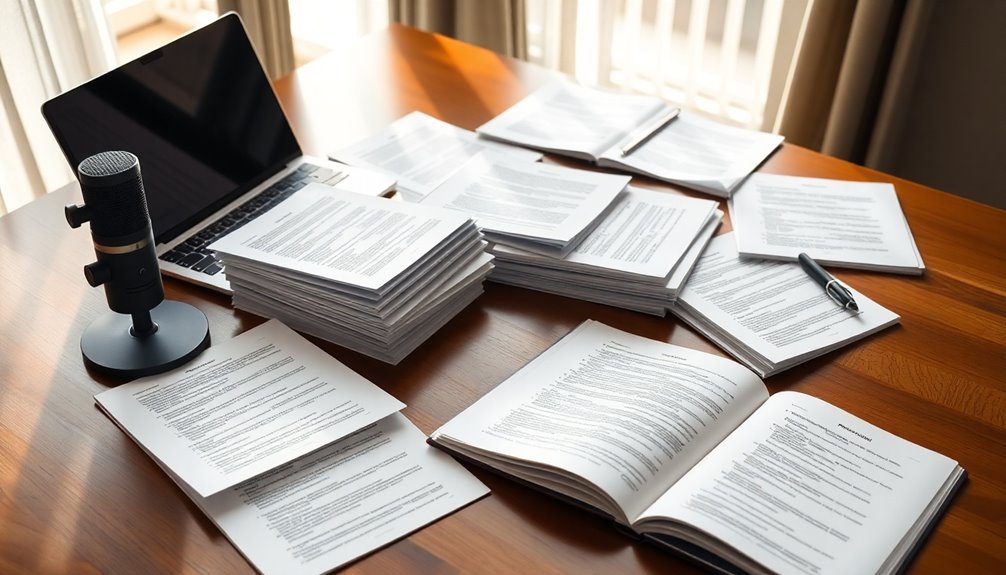Mastering interview transcripts is key to turning raw dialogues into actionable insights. You'll want to capture every detail, ensuring you don't miss critical themes and nuances. Start by developing a clear strategy for transcribing, so you can focus on the conversation without distractions. Don't worry about perfection in your first draft; just get it down. Proofreading and formatting are essential for clarity and accuracy. Understanding interview dynamics will also enhance your transcripts, revealing deeper insights through non-verbal cues. Explore further to discover more strategies that can elevate your transcription skills and improve your overall interview process.
Key Takeaways
- Interview transcripts provide a detailed record of conversations, capturing nuances that inform candidate evaluations.
- Transcription enhances collaboration among decision-makers by facilitating discussions based on accurate records.
- A structured approach to transcription streamlines the process, ensuring efficiency and thoroughness.
- Finalizing transcripts involves proofreading and formatting for clarity and readability, making them easier to share.
- Analyzing transcripts can reveal insights into interview dynamics, including emotional cues and power shifts.
Understanding Interview Transcripts

Understanding interview transcripts is essential for capturing the nuances of conversations that occur during interviews.
An interview transcript is a written record that documents the dialogue between individuals, providing a clear account of responses and interactions. You can create these transcripts in real-time or by transcribing recordings later.
They serve as invaluable tools for reviewing candidate answers and insights, allowing you to analyze the conversation in detail. As you engage with the transcript, you'll find it highlights key points and themes that might otherwise be overlooked.
Benefits of Transcription

Transcribing interviews offers several key benefits that can greatly enhance your hiring process.
First, it captures every detail, providing a reliable reference for later evaluation. You'll find that having a written record allows multiple decision-makers to access the content, fostering collaborative discussions.
Additionally, transcriptions enable you to focus on candidates during the interview itself, without the distraction of note-taking. This thorough documentation supports in-depth analysis of responses, ensuring you don't overlook vital insights.
Finally, it streamlines information retrieval, saving you time when reviewing candidates. By implementing transcription, you not only improve your efficiency but also elevate the quality of your hiring decisions.
Embrace the power of transcription to enhance your recruitment strategy.
Steps to Transcribe

Capturing detailed interview transcripts requires a systematic approach to guarantee accuracy and efficiency.
Start with a clear strategy to streamline your transcription process. Here are three essential steps to take into account:
- Listen Thoroughly: Before diving into the transcription, listen to the entire recording. This helps you grasp the context and identify key points.
- Choose Your Tools: Select audio players and word processors that suit your needs. Familiarize yourself with any shortcuts that can speed up your work.
- Draft Freely: Begin typing the conversation without worrying about formatting. This allows you to focus on capturing every detail before refining the transcript later.
Following these steps can enhance your transcription experience, ensuring you produce accurate and thorough records.
Detailed Transcription Process

To kick off the detailed transcription process, you should first analyze the recording's complexity and the number of speakers involved. This helps you estimate the time commitment. For beginners, it may take 7-10 hours to transcribe a single recording. Use audio players with hotkeys to streamline the process, and start typing in intervals to stay focused. Here's a quick overview of essential aspects:
| Step | Description | Tips |
|---|---|---|
| Analyze Recording | Determine speaker count and complexity | Familiarize yourself |
| Estimate Time | Calculate the expected time based on length and speed | Plan your schedule |
| Use Hotkeys | Utilize shortcuts for efficiency | Customize settings |
Implementing auto-correct and placeholders can enhance your workflow considerably.
Finalizing the Transcript

After you've drafted the transcript, the next essential step is finalizing it for accuracy and readability. This process guarantees that your transcript is polished and ready for sharing.
Here are three key actions to take:
- Proofread and Replay: Go through the draft while listening to the recording again. This helps you catch any inaccuracies and fill in any gaps.
- Format for Clarity: Organize the transcript with proper headings, spacing, and clear speaker identification. This makes it easier for readers to follow.
- Final Review: Double-check everything before distributing or storing the document. Verify that all details are correct and that it meets your intended purpose.
Taking these steps will enhance the quality of your transcript considerably.
Interview Dynamics

Finalizing a transcript sets the stage for understanding the dynamics between the interviewee and interviewer.
You'll notice that the interviewee often holds the spotlight, sharing insights and experiences, while you, as the interviewer, guide the conversation. Your role is essential; you ask questions that not only elicit responses but also encourage the interviewee to open up. Emotional dysregulation can significantly impact how the interviewee responds, influencing the depth of the conversation. Additionally, recognizing how cognitive decline affects communication can provide context for the interviewee's responses.
Power dynamics often shift throughout the interview, as the interviewee's confidence can influence the flow of information. Recognizing these shifts helps you tailor your approach, ensuring a more productive exchange.
Pay attention to non-verbal cues and emotional undertones, as these aspects reveal deeper insights. Additionally, understanding how emotional well-being is affected can enhance your ability to connect with the interviewee.
Ultimately, understanding these dynamics enriches your analysis and interpretation of the interview content.
Writing an Interview Report

Crafting an effective interview report involves summarizing the key elements of the conversation while maintaining clarity and structure. To achieve this, focus on these three essential components:
- Introduction: Begin with a brief overview of the interview's purpose and context, setting the stage for your findings.
- Detailed Account: Document the questions asked and the interviewee's responses. Make sure you capture the essence of their insights and any notable quotes.
- Analysis and Recommendations: Identify key themes or patterns that emerge from the conversation. Conclude with actionable recommendations or follow-up actions based on your analysis.
This structured approach will help you create a thorough report that effectively communicates the interview's significance and findings.
Additional Resources

Utilizing additional resources can greatly enhance your understanding and effectiveness in the interview process. Interview guides are invaluable, providing structured outlines that help you stay focused and cover all relevant topics. Tailoring questions to specific objectives guarantees you gather meaningful insights.
You might also explore related articles that broaden your knowledge, like "How To Become a Sports Broadcaster" for career paths or "20 Teamwork Synonyms To Use on Your Resume" to improve your application language.
Additionally, career development insights can offer you strategies for advancement or change. Engaging with resources on effective public speaking can also boost your confidence and communication skills during interviews.
Always remember, leveraging these resources makes you more prepared and confident, whether you're conducting interviews or preparing for them. Don't hesitate to immerse yourself in these materials for an extensive understanding.
Frequently Asked Questions
What Tools Are Best for Audio Recording Interviews?
When you're recording interviews, consider using tools like Zoom, Audacity, or your smartphone's voice memo app. These options make it easy to capture clear audio.
Zoom allows for remote interviews, while Audacity offers editing features for post-recording adjustments. If you prefer mobile solutions, apps like Voice Record Pro can enhance sound quality.
Always test your setup beforehand to guarantee the recording's clarity and reliability. This'll help you focus on the conversation without distractions.
How Do I Ensure Confidentiality in Interview Transcripts?
To guarantee confidentiality in your interview transcripts, you can start by anonymizing any identifying information, like names and locations.
You'll want to use codes or pseudonyms instead. Consider securing the document with passwords and limiting access to only those who need to see it.
It's also a good idea to regularly remind participants about their privacy.
Can I Transcribe Interviews Using Automated Software?
Yes, you can definitely transcribe interviews using automated software.
These tools can save you time and effort, quickly converting audio to text. However, keep in mind that the accuracy might vary, especially with different accents or background noise.
It's smart to proofread the transcript afterward to guarantee it captures the conversation correctly.
Combining automation with your own review can lead to a more reliable and polished final document.
What Are Common Mistakes to Avoid in Transcription?
You might think transcription is straightforward, but common mistakes can derail your work.
Avoid overlooking audio quality; poor sound leads to errors.
Don't rush—take your time to guarantee accuracy.
Skip formatting too early; it's better to focus on getting the content right first.
Finally, double-check speaker identification; mislabeling can confuse readers.
How Long Should I Keep Interview Transcripts on File?
You should keep interview transcripts on file for at least one year, but ideally longer, depending on your organization's policies and any relevant regulations.
This time frame allows you to reference past interviews for future hiring decisions, performance reviews, or audits.
If you're involved in sensitive positions or industries, extending this period might be necessary.
Regularly review and securely archive older transcripts to maintain an organized record-keeping system.
Conclusion
Now that you've accessed the secrets of mastering interview transcripts, imagine the power at your fingertips. With each carefully crafted word, you'll capture the essence of conversations, ensuring clarity and insight. Picture yourself seamlessly transcribing, analyzing, and reporting like a pro. But wait—what if there's more to uncover? Dive deeper into the nuances of your newfound skills, and watch as your interviewing prowess transforms, revealing doors you never knew existed. The journey has just begun!









